#Labour Union
Explore tagged Tumblr posts
Text
Your boss and your landlord work together
As we see rents getting higher and pay completely stagnating we see an interesting interaction between our bosses and our landlords.
Fundamentally, your landlord charging you more in rent is good for your boss. In order to pay your higher rent, you will have to work more. Your boss will then leverage this, consciously or otherwise, to further exploit you for your labour.
You'll be "offered" overtime, often as a gesture of "goodwill", or even other work, often for horrifically low pay.
Here in the UK, landlords can request to see your income as a "guarantee" that you can pay your rent. They will then use this to argue that they can charge you a higher rent on your contract renewal. Of course, they were going to do that anyway, regardless of any increase in income.
Thankfully, there are ways that we can collectively fight back. Join a workplace union, and join a tenants union, and push back against these masters. There is plenty more than you can do, but I probably can't get away with saying it here...
They're working together, so can you.
Solidarity folks. <3
17 notes
·
View notes
Text
Visiting the Monterey Bay aquarium was the highlight of my vacation to California several years ago. I support these unionization efforts to ensure that many more visitors have the chance to say the same.
pssst the Monterey Bay Aquarium workers are unionizing and you can show your support 👇
#politics#unions#union#unionization#trade union#trade unions#trade unionism#labor#labour#labor union#labor unions#labour union#labour unions#monterey bay aquarium#labor rights#union strong#unionize
18K notes
·
View notes
Text
Collective bargaining agreements (CBAs) in the United States
Topic: What are Collective bargaining agreements (CBAs) in the United States Collective bargaining agreements (CBAs) in the United States are legally binding contracts between employers and labor unions that outline the terms and conditions of employment for the employees represented by the union. These agreements are negotiated through a process called collective bargaining, which is the…
#CBA#CBAs#collective agreements#collective bargaining#collective bargaining agreements#employee conditions#employee protection#Labor Law#labour rights#labour union#union#work union
0 notes
Text
Allow each Governor negotiate what it can pay - Governors
Their call came as the Nigerian Governors’ Forum, NGF, said on Wednesday night that it would not cease to engage the stakeholders to reach a consensual solution to the new minimum wage crisis. Although President Bola Tinubu, in an unusual manner, was in attendance at the National Economic Council, NEC meeting often chaired by Vice President Kashim Shettima but silent throughout the meeting. It…
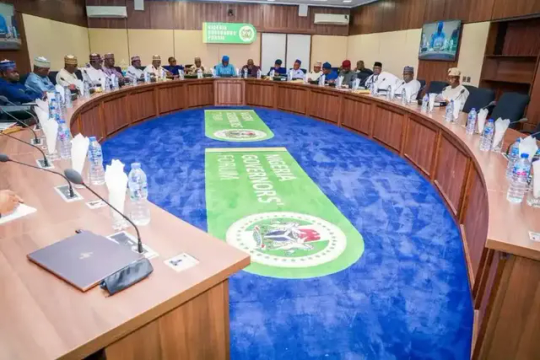
View On WordPress
#governors#indefinite strike action#labour union#meritime workers of nigeria#national assembly#NEC#new minimum wage#News#Politics#president#the private sector workers#the public sector workers#trade union#vice president
0 notes
Link
The incessant labour union strike, from ASUU to the NLC, has become a regular staple in Nigeria’s litany of underdevelopment characteristics. And the industrial disputes usually result from labour unions reactions to what is perceived as government’s recurring insensitivity to the plight of workers in the dynamics of governance.
0 notes
Text
i went to a leftist festival last month and there was a panel dedicated to prostitution, why abolition is the only road to go for leftists and how to help and support prostituted women exiting the trade, and i keep thinking about that union organizer who said, "we hear more and more that 'sex work is work', but if that were true, then there'd be professional trainings leading to a qualification for prostitution, then there'd be prostitution diplomas, then high schoolers could send applications to follow those trainings and become prostitutes. but we all know that all these things don't exist, and if they did exist we would all recognize them for what they are: a grooming business encouraging pedophilia and violence against women and girls." and what she said later; "trade unions that argue that 'sex work is work' never engage in legal battles against pimps or brothel owners. they don't even recognize that pimps are the bosses of the prostitution market. "sex workers' trade unions" don't fight pimps because sex workers' unions don't represent the alleged "workers" (prostituted women), they represent the bosses: pimps."
and that made me think of what Kajsa Ekis Ekman said about the trade unions that consider prostitution to be work and prostituted women to be workers: they offer trainings about condom use and spend millions of dollars funding "worker peer education" about "safe sex".

So one again, it's prostituted women who are held responsible for the spreading and the prevention of STDs - not the johns, not the pimps. the prostituted women, many of them victims of sex trafficking. "As human trafficking expert Malka Marcovich has pointed out, this means a return to nineteenth-century ideals of hygiene, where the onus was “primarily on the women to take responsibility for the health of ‘the customer’, so diseases would not be spread to their families” (2007, p. 347)."
It's quite obvious to any trade union organizer that prostitution is not work and the sex trade can't be organized as a trade union. a few months ago, the biggest unions in my country (which included the traditional left-wing trade unions as well as students' unions) issued a paper condemning the 'sex work is work' narrative and the pimp lobbies got so mad about that because they know their strategy isn't working because leftists know what left-wing politics look like and they know women's liberation doesn't come from prostitution. Now it's interesting that the biggest voices of the "sex work is work" movement come from the USA, where the anticapitalist left doesn't exist. American liberals love to pass reactionary politics as revolutionary but not because they are stupid in their own country does it mean they should influence the actually left-wing labour movement in other countries, right?
2K notes
·
View notes
Text
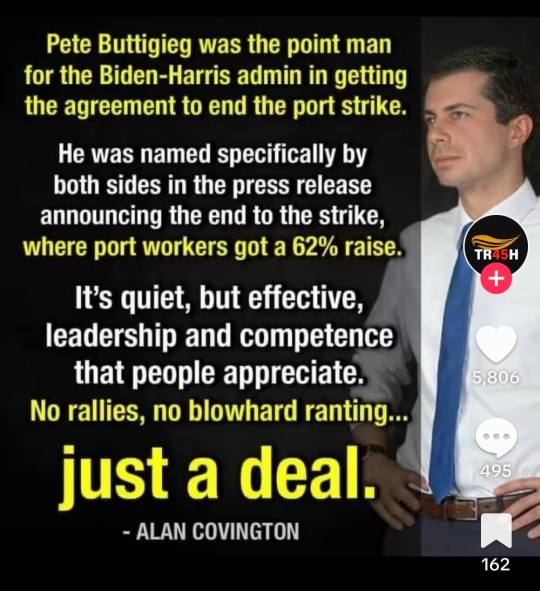
This is what happens when you elect Democrats- no talking points lifted from the Third Reich, no constant whining and lying on Xitter, no coup attempts.
Just steady, competent governance that no, may not fix everything all at once, but does keep the country running while making life meaningfully and measurably better for the working class.
#US#Politics#Election#2024#Labour#Unions#Union Strong#Longshoremen#Strike#Bidenomics#Biden Wins#Wages#Pete Buttigieg#Mayor Pete#Thank You Mayor Pete#Thank You President Biden#Kamala Harris 2024#Yes We Kam!#Vote#Vote Blue
1K notes
·
View notes
Text
God I love the episodes of Leverage that are like “yes Eliot is working class. yes he grew up surrounded by trades people and “menial” labourers. yes he knows so much about those jobs and will ALWAYS support those workers and their job choices.”
Because it’s something that really does set Eliot apart from the other characters. Like, Sophie is all about the finer things in life, and even if she did ever grow up poor or around labourers, she doesn’t exactly respect that life style. She’s all about getting away from that, if she ever was that lower class, which I don’t think she ever really was. Nate is Office Worker tm, just in vibes. That man has never seen a shovel. And while Parker and Hardison both went through the system, they’re both very city centric. And I mean, Parker has never once thought about real jobs or anything, ever. And Hardison definitely has a bit of a thing about age of the geek, and def starts out looking down on “menial” jobs.
But Eliot, throughout the entire show, is very much all about that. The mining episode in particular is such a favourite just because of the respect and care for these workers that Eliot shows. And I really like how different all of the leverage characters are, not just in skills but also in backgrounds, and how those backgrounds affect how they treat people. Eliot comes from a family of workers and a community of workers, and he holds those people in such high respect.
#leverage#unions#I know that there are more eps like this but rn my brain only says the mining episode#cuz I just watched it#but this is in fact what happens when you have both a leverage obsession and a labour rights special interest#eliot spencer
3K notes
·
View notes
Text


People in Britain! If you want to connect to fellow workers and learn all about organising please consider coming to our conference in Manchester on July 26!
You don't need to be in a union, you don't need to have union recognition at work, you don't need to know anything!
This is specifically for people who are interested in learning about organising at work, no matter what stage, even if the idea has just crept up in your mind!
We are not affiliated to any political party or any particular union. We are here to support each other in organising our workplaces.
Our conferences are participatory - we have had enough lectures from above and are more interested in a rank-and-file viewpoint and democratic organisation.
Tickets starts at £5 including lunch!
We also have free childcare available, please sign up early if you require this!
Get your tickets here: https://troublemakersat.work/conference-2025/
And given the recent news from Britain: As one of the coordinators of Troublemakers at Work, I can only stretch that I will always support trans people (because I mean it when I say solidarity forever), JK Rowling is a despicable transphobe and British institutions clearly care more about catering to her and her thugs' selfish interests than enhancing the rights of oppressed people.
#trade union#labour#strike#union#solidarity#anti capitalism#britain#jk rowling#jkr#anti jkr#fuck jkr#transgender#lgbtq#manchester
186 notes
·
View notes
Text
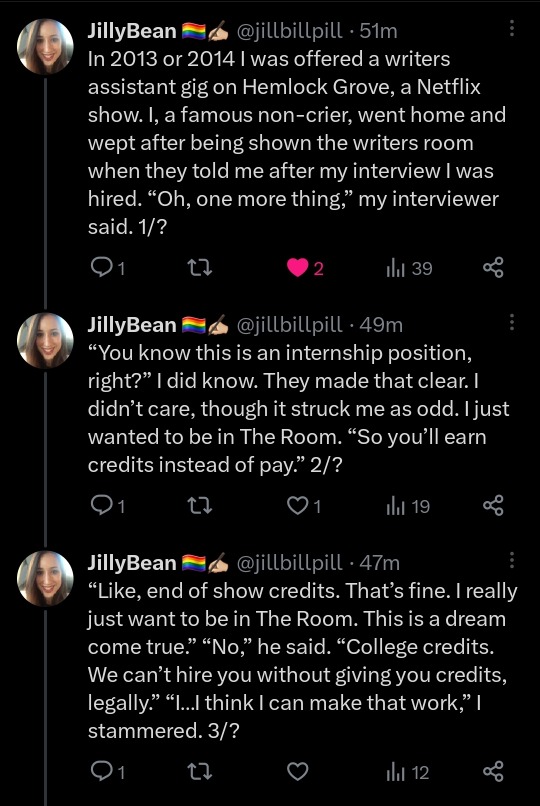
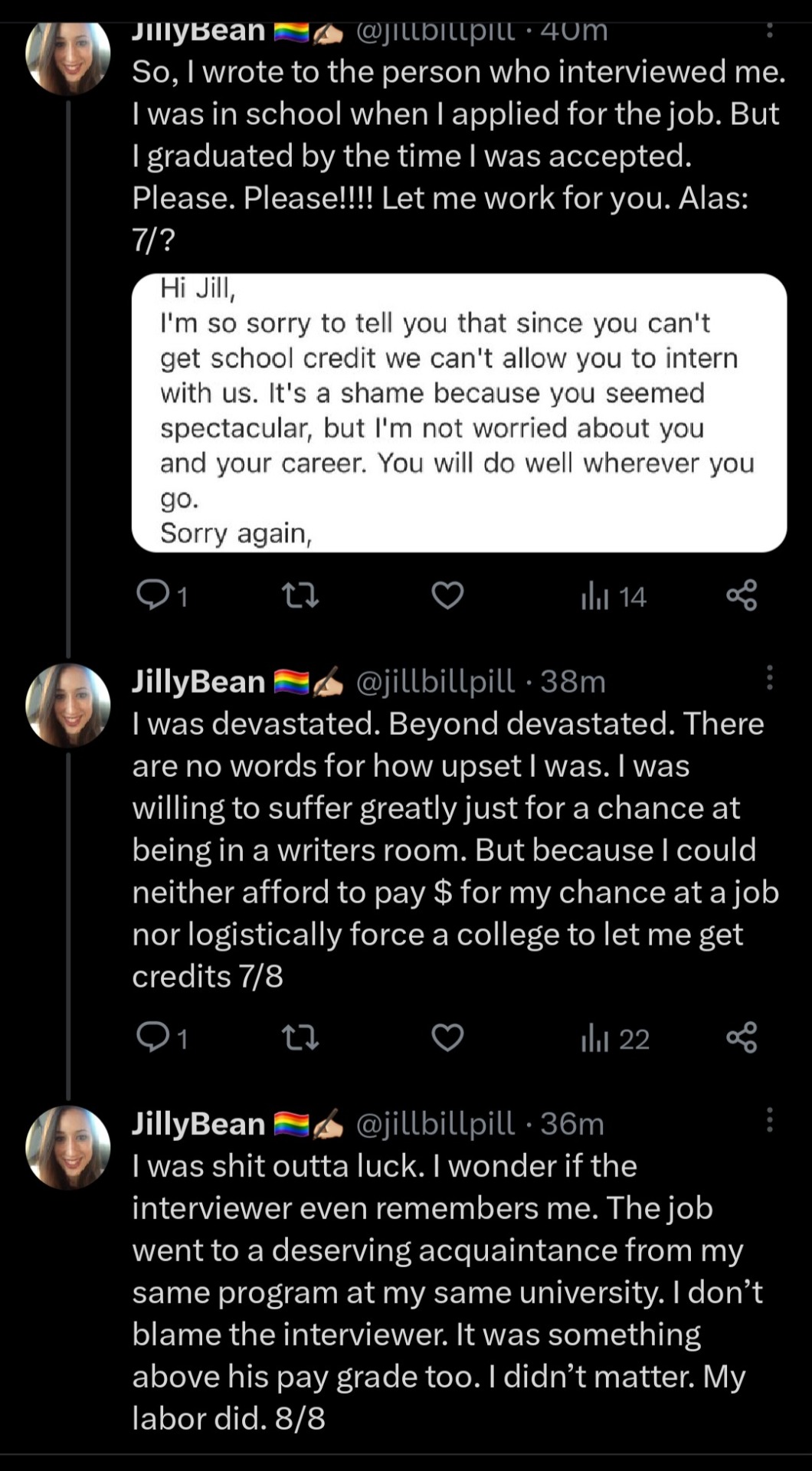
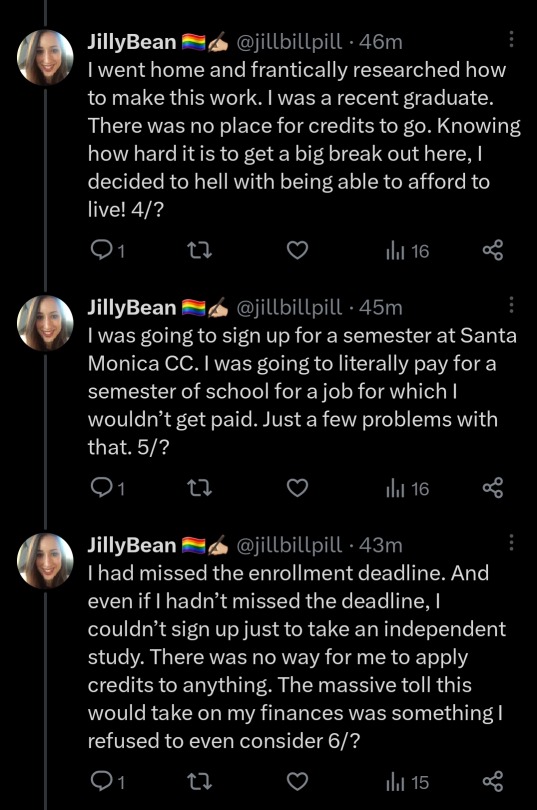
Here's how to help support those making your shows!
2K notes
·
View notes
Text
TIL that UK Labour law is so anti Union that according to this Variety article, in general you will have to continue to work on projects under Equity* contract even if you're a SAG-AFTRA member otherwise you can face consequences such as dismissal or even being sued for breach of contract.
I'm sharing this in case there are questions about why this or that actor seems to continue to work during the strike. We don't know their contract and if it's Equity instead of SAG, they're not scabbing. It's not their fault, it's the fault of the studios in the US and the government in the UK.
*Equity is the UK version of SAG-AFTRA
#sag strike#sag aftra#sag aftra strike#sag aftra strong#wga strong#wga strike#hmm in adding these tags i admit idk#how this affects the writers#im guessing tho that its probably the same#equity#equity uk#equity union#uk labour laws#zi's#100#500#1k
2K notes
·
View notes
Text
Faced with Donald Trump's tariff threats against Canada, the latter must go “eye for eye, tooth for tooth,” play to its strengths and not put itself in a position of weakness vis-à-vis him, by avoiding responding to every one of his “outlandish” assertions.
At her traditional news conference at the start of the year, FTQ (Fédération des travailleurs et travailleuses du Québec) president Magali Picard spoke of the fears from her major affiliated unions and their members in the face of the 25 per cent tariff threats issued by the U.S. president-elect.
The United Steelworkers, Unifor and the Teamsters, all major affiliates of the QFL, would be particularly hard hit by these potential U.S. tariffs, since they have a strong presence in mining, metallurgy, timber, forestry and transport.
[...]
The FTQ's position is important because its major affiliates have links with American unions, which could become either allies for jobs or obstacles in this debate.
This report by The Canadian Press was first published in French on Jan. 14, 2025.
Full article / Article en français
Tagging: @allthecanadianpolitics
this is only partially related (hence the small text), but I do think it's wild how many times I've heard people from québec use the phrase "eye for an eye"/"œil pour œil" considering that whenever they hear it in the context of the Qur'an, they can't shut up about how it makes Islam regressive
#cdnpoli#québec#FTQ#QFL#donald trump#tariffs#québec federation of labour#Fédération des travailleurs et travailleuses du Québec#magali picard#unions#trade unions#united steelworkers#unifor#teamsters#united states#canada#canadian news#québec news#mine
87 notes
·
View notes
Text
qsmp is dying rb to make it die faster
#SORRY THISBIS WILD HES ABOUT TO BE SUED BY LABOUR UNIONS AND JUST FIRED ALL THE STAFF HE PROMISED HE WAS GOING TO START PAYING??????#HUH . ‘if i can’t fund it ill shut it down’ so shut it down
314 notes
·
View notes
Text


"That's a far better thing to do than smash up a TV studio. That's pointless. That's as pointless as trashing a hotel room. You know?
If you're going to be violent, then I think you should channel your violence in the right direction. And I think the right direction is [at] people who break up strikes, people that are currently destroying the health service."
BOBBY GILLESPIE OF SCOTTISH ACID HOUSE BAND PRIMAL SCREAM, BEING BASED IN 1990. INTERVIEW WITH LATE NIGHT TV SHOW, TRANSMISSIONS.
#His dad was a union man and he taught Bobby well#Bobby Gillespie#Primal Scream#music#musicians#1990#rockstars#rock n roll#labor rights#labour solidarity#politics#unions#workers rights#healthcare#NHS#he was asked about doing Top of the Pops with Loaded. Interviewer said 'I thought you were going to trash the stage'.#90s#90s music#acid house#madchester#rock music#Scotland
84 notes
·
View notes
Text
Made in the USA: Wage Theft, Fraud and Hidden Sweatshops
Unrolled twitter thread by derek guy (@dieworkwear)
4 Oct 24 • Read on X
ALT enabled on all images. Video has closed captions but is not transcribed.
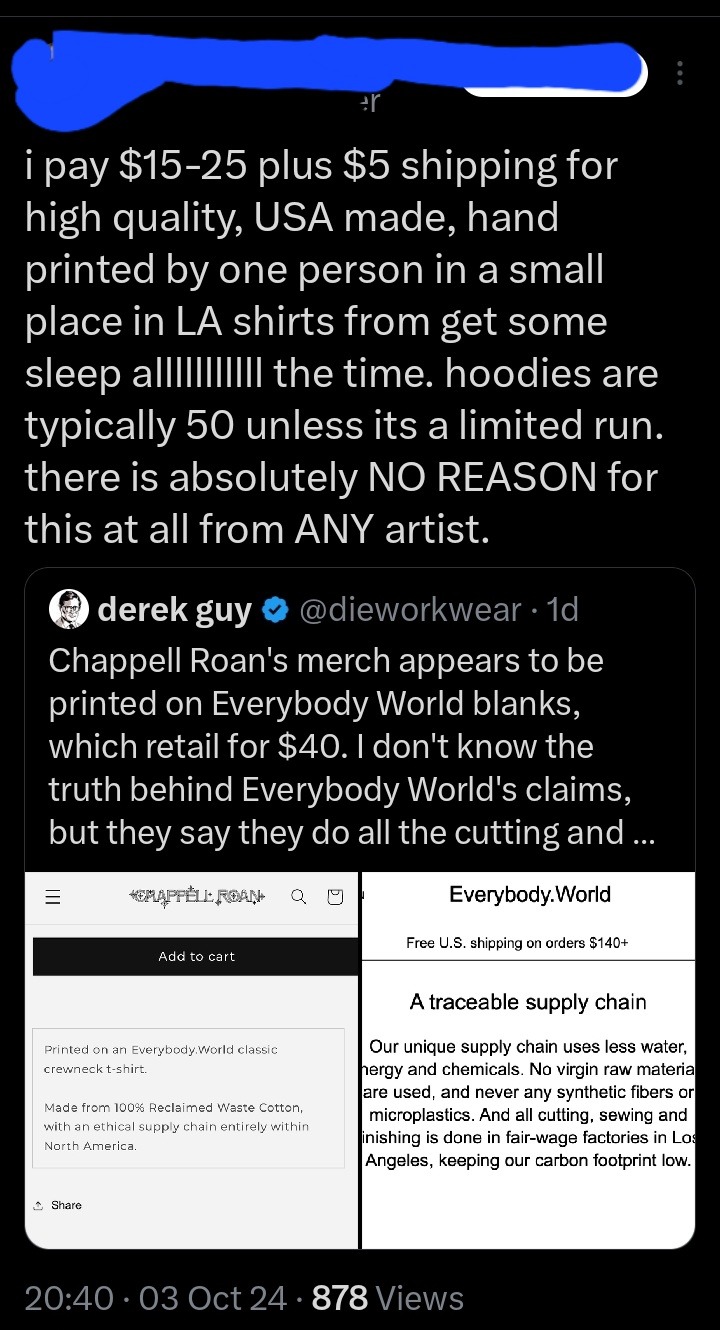
Not trying to create a pile-on here. But let's talk about why something might still be made in unethical conditions even though it bears a "made in USA" tag. 🧵
The first thing to understand is that not all workers are covered by US labor laws. You might assume that workers get paid a minimum wage (after all, it says "minimum"). In fact, many garment workers in the US toil under what's known as the piecework system.
Piecework means you get paid not by the amount of time you work but the number of operations you complete. This system should be familiar to many of you. As a writer, I get paid per word. The pay is the same whether it takes me 100 or 10 hours to write a 1,000 word article.
My situation is fine bc I get paid enough to eat. But for a garment worker, the pay structure can be peanuts: three cents to sew a zipper or sleeve, five cents for a collar, and seven cents to prepare the top part of a skirt. These are real numbers for LA-based garment workers.
Piecework is how companies skirt minimum wage laws. Among labor organizers, the term "wage theft" refers to the difference between what a worker should have earned under min wage laws and what they actually earned through the piece rate system.
This system is incredibly common. A 2016 UCLA Labor Center study showed the median piece-rate worker in Los Angeles scrapes together $5.15 per hour—less than half the state’s mandated minimum wage. Labor conditions are also very bad: poor ventilation, dusty air, rats and mice.
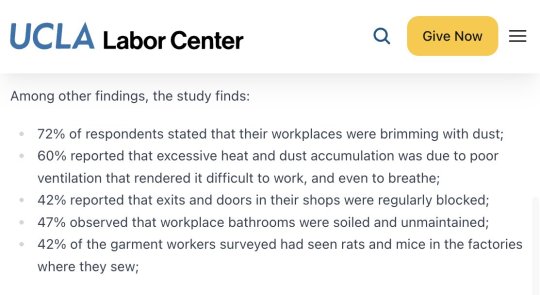
A Federal Department of Labor investigation the same year found that 85 percent of Los Angeles garment factories were breaking labor laws. In 2016, these violations amounted to $1.3 million in back wages owed to 865 workers in a sample of 77 factories. This is wage theft.
In 2021, labor organizers won a fight to get piecework banned in California. But two years later, it's still incredibly common. I interviewed an LA-based garment worker who toils 12 hrs a day for $50. She sleeps in the corner of a kitchen. From my article in The Nation:
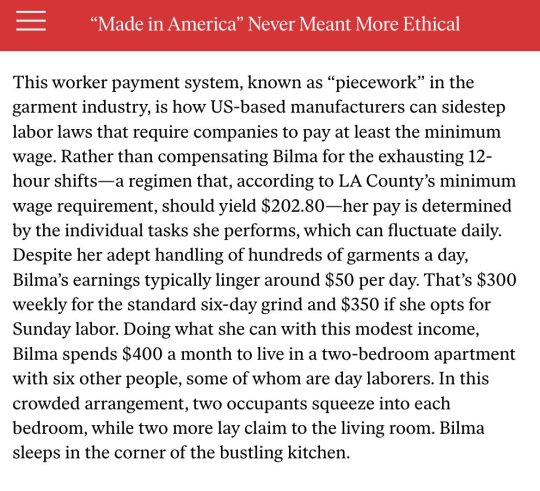
Currently, there's a new fight get piecework banned nationwide through the FABRC Act. I would link, but Twitter throttles threads that have outbound links, so I would prefer if you Google how you can support this legislation. Or follow @GarmentWorkerLA for more info.
The other reason why a "made in USA" tag may not mean much has to do with how the label is applied.
When you see this label inside your garment, what do you assume? Think about this before moving on to the next tweet.
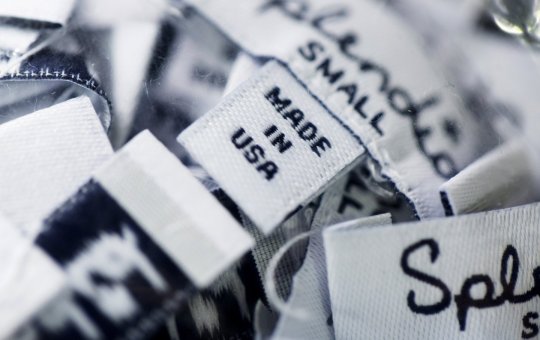
The Federal Trade Commission has pretty strict rules on who gets to apply that label. For clothes, the item has to be cut and sewn in the US using materials that were made in the US. The FTC tries to match its rules with the common understanding of what "made in US" means.
If you're a giant company like Levi's or LL Bean, you may have lawyers who are advising you on these rules. This is why you see labels like "imported," which means the item was made abroad. Or "made in the US from imported materials" when they can't meet the MiUSA standard.
But it's incredibly common for companies to violate FTC rules. In 2022, the FTC fined the pro-Trump brand Lions Not Sheep $211k for labeling their t-shirts "made in USA" when the shirts were actually imported from China and other countries.
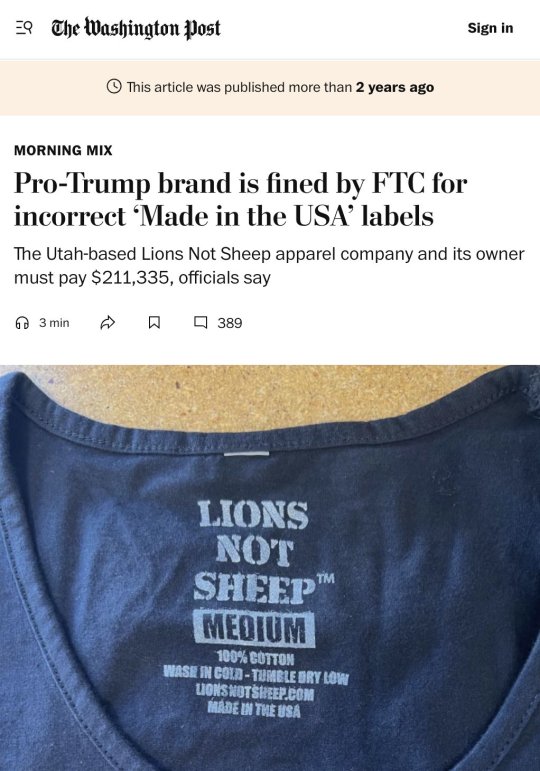
The company was basically importing blanks from China, ripping out the "made in China" label, screen printing the shirt in the US, and then applying a new screen-printed "made in US" label. CEO Sean Whalen claimed he was being persecuted for his pro-Trump views.
But the whole thing started bc Whalen made a video about how his customers are price sensitive, so he imports blanks from China. That's what kicked off the FTC investigation. So while this mislabeling is common, it's hard to get caught unless you make a video about your crimes.
The truth is that making a t-shirt in the USA according to FTC standards will result in a relatively expensive garment. Heddels and Velva Sheen both produce shirts in the US from US grown cotton. The first is $26; second is $90 for a two-pack.
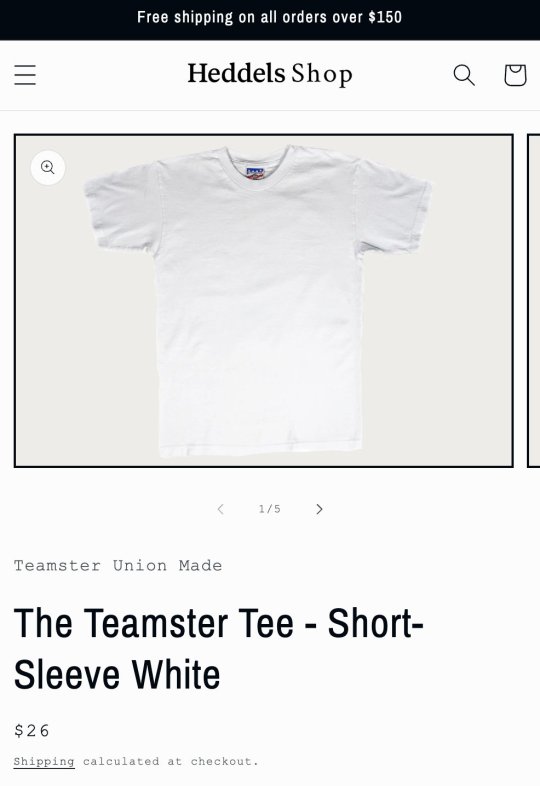

Once you add things such as screenprinting—or if you want a more unique cut and not just basic blanks—the costs go up. This is why Bikers for Trump sourced their merch from Haiti. They knew their customers would not pay an extra $8 for true made-in-USA production.
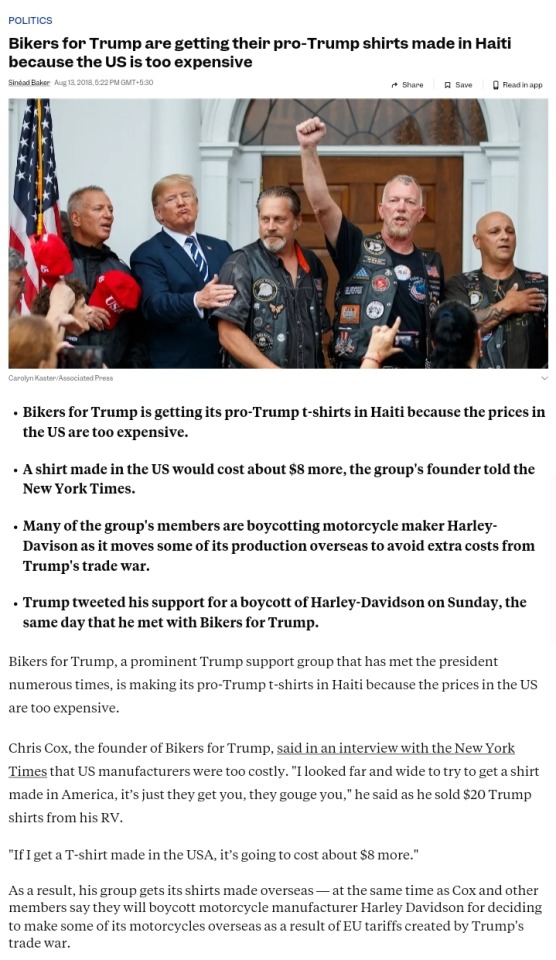
Today, there are countless companies that make merch for other organizations. They source their t-shirts from a variety of places—some made in the US, most not—and then screenprint a design and fulfill orders. This way, the other org doesn't have to do any work but marketing.
When you see a screenprinted t-shirt for $20, ask yourself: Where was the material grown? Where were the yarns spun? Where was the cutting, sewing, and finishing performed? Where was the screenprinted done? What were the wages and labor conditions along these steps?
I'm not a nationalist, so I don't prioritize American jobs over foreign ones. But I do care about fair wages and labor protections. Just because something was made abroad doesn't mean it was made in a sweatshop. Just because it was made in the US doesn't mean fair wages.

Paying more for a garment is also no guarantee of ethical manufacturing. But when the price of a garment is so low, you leave little on the table for workers. Just because you see a $20 t-shirt that says "made in USA" doesn't mean it was made fairly.
Please don't harass the person who posted that original tweet. My intention is not to cause harm or stress for anyone. Only to help shed light on what goes into garment manufacturing, fair labor, and labeling. Hopefully, you will consider these issues when shopping.
For the inevitable question: "How do I make sure my clothes were made ethically?" This is very difficult to answer in a thread. My simplest answer is that we should elect pro-worker politicians, fight for pro-labor laws, and empower unions so workers can advocate for themselves.
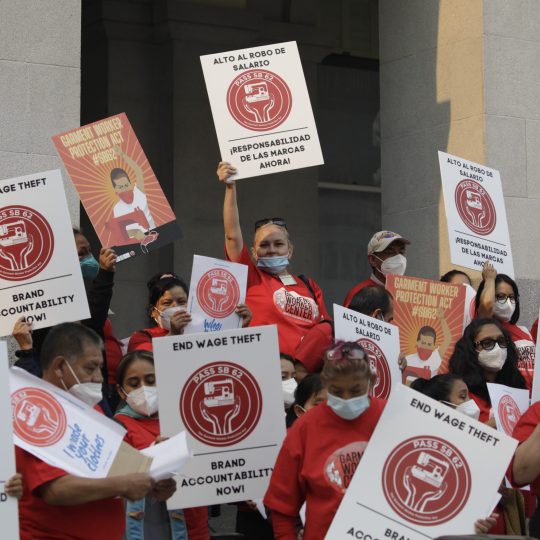
--------------------End----------------------
TL; DR: Doesn't matter if it's the US, if it's not union it's probably a sweatshop. And not all merch is priced high because of fair labour conditions (looking at Taylor Swift and Beyoncé). Look for supply chain transparency.
#sweatshops#fashion#american sweatshop#chappell roan merch#sweatshirt#chappell roan#merchandise#made in usa#garment industry#fast fashion#worker rights#labour rights#labour unions#capitalism#worker exploitation#us politics#us law#knee of huss
134 notes
·
View notes
Text
The penultimate chapter of KMKY is up, and it came in at a whopping 120 pages of pure ANGST!
Full of electrifying prose, zippy one liners and dialogue that's music to your ears, this chapter has it all! So hop, skip, jump, shuffle, run and twerk your way over to AO3 to treat yourself!
Only one more chapter until it's all over ~

#kmky#knowing me knowing you#billford#billford fanfic#the chapter is posted for you all to enjoy at last#it was two months in the making this one#thats why it was so beefy#i was toiling in the fanfic mines after my fulltime job hahah#maybe fanfic writers should join a union do we get union rates for free labour?#a question for the ages#i hope you all enjoy and let me know what you thought!#and feel to don your tinfoil hats if you have any conspiracy theories about the final plot twist#winner gets a prize!#the prize is being right!
45 notes
·
View notes